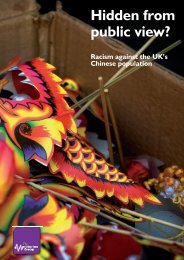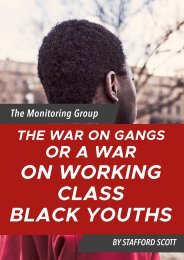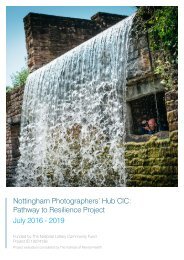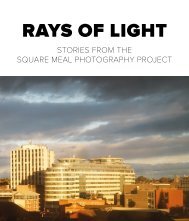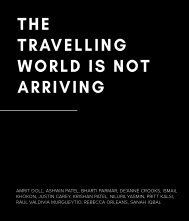Coming of Age : 1976 and the Road to Anti-Racism
Coming of Age : 1976 and the Road to Anti-Racism by Jagdish Patel and Suresh Grover
Coming of Age : 1976 and the Road to Anti-Racism
by Jagdish Patel and Suresh Grover
You also want an ePaper? Increase the reach of your titles
YUMPU automatically turns print PDFs into web optimized ePapers that Google loves.
This was happening not <strong>to</strong> me alone, this is how it worked.<br />
HP: And how was it working at Woolf’s rubber fac<strong>to</strong>ry?<br />
VS: Most people coming from villages were not used <strong>to</strong> working in industry <strong>and</strong> it was difficult<br />
in <strong>the</strong> beginning for <strong>the</strong>m <strong>to</strong> adapt <strong>to</strong> <strong>the</strong> new environment. There was <strong>the</strong> problem <strong>of</strong><br />
language for many, <strong>and</strong> colleagues who knew English would interpret from charge-h<strong>and</strong> <strong>and</strong><br />
foreman. We, with <strong>the</strong> Irish, Polish, few West Indians, were in <strong>the</strong> smelly jobs, burning rubber,<br />
<strong>and</strong> so on. White people were in <strong>the</strong> white- collar jobs like transport or admin. Immigrants<br />
were concentrated in production. [Woolf’s made rubber accessories <strong>and</strong> <strong>the</strong> process used<br />
carbon black <strong>and</strong> sulphur which made <strong>the</strong> work smelly <strong>and</strong> unpleasant. A sixty-hour week was<br />
considered normal <strong>and</strong> pay so low that most men did overtime, taking <strong>the</strong>ir week <strong>to</strong> some<br />
seventy-five hours over seven days. (1)<br />
There was no union in <strong>the</strong> fac<strong>to</strong>ry for a very long time <strong>and</strong> people thought, because <strong>of</strong> <strong>the</strong><br />
appalling conditions <strong>and</strong> very low wages, we must form one. Some <strong>of</strong> <strong>the</strong> people [Sharma<br />
himself] already had trade union activity in India so it was not difficult for <strong>the</strong>m <strong>to</strong> realise that<br />
till we formed a union, our interests would not be protected nor could we compel management<br />
<strong>to</strong> accept our conditions. So, <strong>the</strong> first meeting for this purpose was held on 1 May 1957<br />
in <strong>the</strong> community center. But <strong>the</strong> management resisted <strong>and</strong> sacked one or two workers who<br />
wanted <strong>the</strong> union. [Attempts were made in 1958 <strong>and</strong> again in 1960 <strong>to</strong> establish a union.] But<br />
<strong>the</strong>n in 1963, we in <strong>the</strong> Indian Workers’ Association brought in <strong>the</strong> Transport Workers’ union<br />
<strong>and</strong> tried <strong>to</strong> get everyone <strong>to</strong> join, but secretly, going house <strong>to</strong> house in <strong>the</strong> community, so<br />
management could not know <strong>the</strong> people who were actively behind this. After two, three,<br />
months majority <strong>of</strong> <strong>the</strong> workers in production department had become members <strong>of</strong> <strong>the</strong> union<br />
<strong>and</strong> <strong>the</strong>n <strong>the</strong> matter was h<strong>and</strong>ed over <strong>to</strong> union <strong>of</strong>ficials <strong>to</strong> negotiate with fac<strong>to</strong>ry management.<br />
HP: When did <strong>the</strong> Indian Workers’ Association form, <strong>the</strong>n?<br />
VS: The first Indian Workers’ Association was formed in <strong>the</strong> UK in late 1930s, but with hardly<br />
any branches, perhaps London, Manchester, Huddersfield <strong>and</strong> Coventry. Southall people<br />
were first members <strong>of</strong> <strong>the</strong> London branch, but Southall branch had its inaugural meeting on<br />
3 March 1957 at <strong>the</strong> community centre <strong>and</strong> I think <strong>the</strong>re were about 200 members. They<br />
had <strong>the</strong>n no separate <strong>of</strong>fice but met at <strong>the</strong> community centre. IWA was set up for three<br />
main purposes: as a platform <strong>to</strong> make people realise <strong>the</strong>y were no longer farmers but now<br />
workers – hence Indian Workers’ Association. (It was not a separate ethnic union, it was also<br />
encouraging its members <strong>to</strong> join a union <strong>to</strong> protect <strong>the</strong>ir rights.) Second, most <strong>of</strong> <strong>the</strong> people<br />
found difficulties in approaching doc<strong>to</strong>rs, going <strong>to</strong> hospitals, or solici<strong>to</strong>rs <strong>to</strong> buy houses <strong>and</strong><br />
such things, so IWA provided a free service, for example <strong>of</strong> interpreters <strong>to</strong> people in need.<br />
The third purpose was <strong>to</strong> organise a campaign against <strong>the</strong> overwhelming racial prejudice <strong>and</strong><br />
discrimination we faced: IWA gave a lead.<br />
<strong>Coming</strong> <strong>of</strong> <strong>Age</strong> | 105<br />
<strong>Coming</strong> <strong>of</strong> <strong>Age</strong> Final version 16.10.indd 105 17/10/2017 12:08



